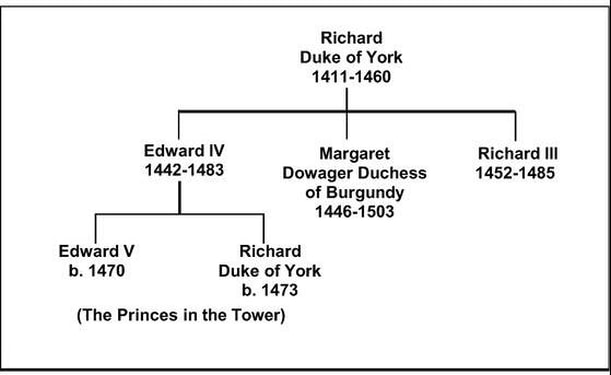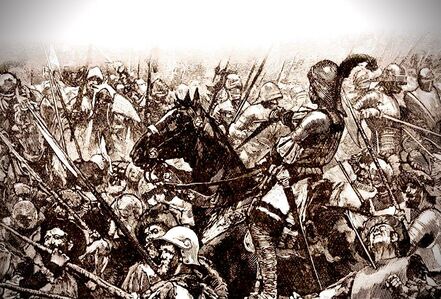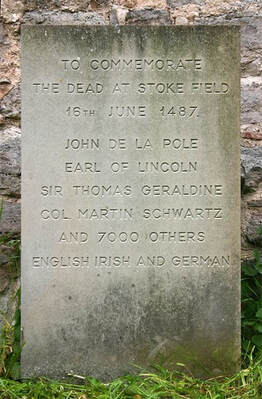
Francis Lovel and Edward V
In 1486, Francis attempted to start a revolt against Henry in the north of England which did not receive adequate support so he travelled to Malines in Flanders to seek help from Margaret Dowager Duchess of Burgundy, Richard’s wealthy sister.
Polidore Vergil, who was commissioned by Henry VII to write a history of England described Margaret thus; "She pursued Henry with insatiable hatred and with fiery wrath never desisted from employing every scheme which might harm him as a representative of the hostile faction."
A receipt for weapons
Margaret provided Francis with 2000 German mercenaries under their commander Martin Schwartz. Their armament included pikes and in 2020, the receipt for their purchase was found in the Archives Départmentales du Nord in Lille, France by a researcher working for Philippa Langley’s Missing Princes Project. [1]
"...400 long pikes made of ash… which the king has taken away and bought from me in the month of June, the year one thousand four hundred and eighty-seven… to be distributed among German-Swiss pikemen who were then under the command of my lord Martin de Zwarte a knight from Germany, to take and lead across the sea, whom Madam the Dowager sent at the time, together with several captains of war from England, to serve her nephew – son of King Edward, late her brother (may God rest his soul) who was expelled from his dominion..."[2]
This document clearly states that Margaret’s purpose in providing men and weapons for Francis was to enable him to overthrow Henry and re-instate Edward V, the elder of the Princes in the Tower as King of England.
In 1486, Francis attempted to start a revolt against Henry in the north of England which did not receive adequate support so he travelled to Malines in Flanders to seek help from Margaret Dowager Duchess of Burgundy, Richard’s wealthy sister.
Polidore Vergil, who was commissioned by Henry VII to write a history of England described Margaret thus; "She pursued Henry with insatiable hatred and with fiery wrath never desisted from employing every scheme which might harm him as a representative of the hostile faction."
A receipt for weapons
Margaret provided Francis with 2000 German mercenaries under their commander Martin Schwartz. Their armament included pikes and in 2020, the receipt for their purchase was found in the Archives Départmentales du Nord in Lille, France by a researcher working for Philippa Langley’s Missing Princes Project. [1]
"...400 long pikes made of ash… which the king has taken away and bought from me in the month of June, the year one thousand four hundred and eighty-seven… to be distributed among German-Swiss pikemen who were then under the command of my lord Martin de Zwarte a knight from Germany, to take and lead across the sea, whom Madam the Dowager sent at the time, together with several captains of war from England, to serve her nephew – son of King Edward, late her brother (may God rest his soul) who was expelled from his dominion..."[2]
This document clearly states that Margaret’s purpose in providing men and weapons for Francis was to enable him to overthrow Henry and re-instate Edward V, the elder of the Princes in the Tower as King of England.

Margaret also provided a fleet of ships which took the army to Dublin where Edward was crowned and anointed in the cathedral on Sunday 27 May 1487. The rebel army then crossed to England but were defeated by Henry’s troops at the Battle of Stoke Field, near Newark on 16 June. The picture shows how the battle was illustrated in Cassells Encyclopedia in 1901 and shows pikes like those in the receipt being used.

The memorial to the fallen in the churchyard at East Stoke lists the names of some of the fallen including Col. Martin Schwartz. Lovel is not included and two eye-witnesses saw him leaving the battlefield alive. One had been sent by the Mayor of York to observe the rebel army's progress and report back and the other a herald belonging to Henry's court. The man from York reported that 'the Lord Lovell was discomfotid and fled' and the herald reported that 'the Vicount Lorde Lovell put to flight'' [3]
There have been no eye-witness reports of Francis Lovel since then. Nothing more was heard of Edward either, and there is no suggestion that he came to Gedling with Francis. However, if Henry had captured him at Stoke he would probably have been murdered to eliminate further uprisings.
What if ...?
Had Francis and the rebels won the battle of Stoke Field, Edward V would have been restored as King of England, the Tudor period would have lasted less than two years, there would have been no Henry VIII, no Elizabeth I (and possibly no Church of England). As it was Francis was never seen again.
References
1 Philippa Langley, The Princes in the Tower, (2023), pages 173-188 and 309-10
2 Archives Départmentales du Nord, ADN B 3521/124564
3 Angelo Raine (ed.) York Civic Records 2, York Archaeological Society Record Series Vol. 103, (1941), pages 22-23
see also
Thomas Hearne, Lelandi Collectanea, The Christening of Prince Arthur, His Majesty’s Progresse to Canterbury, and other Parts, and the Battle of Stoke, (1770), pages 204 -14
